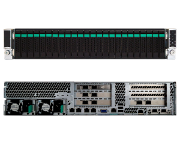Open-E posted it’s certification of the ION SR-71mach4 SpeedServer on 23 June 2014. The Open-E Certification process focuses on functionality and stability, efficiency and usability. Additional benchmark by ION testing demonstrated iSCSI target performance with Open-E DSS V7 doing random I/O at almost 8GBps or up to 375,000 IOPS or latency as low as 0.42ms. All-SSD iSCSI targets enable a wide range of high-performance applications.
Based, as it is, on Intel ServerBoards, Intel RAID Controllers, Intel S3500 SSDs and Intel NICs, the ION SR-71mach4 SpeedServer easily passed all of Open-E’s certification tests. ION then performed additional benchmarks to illuminate the speed and power of the mach4 system running Open-E DSS V7 in iSCSI target usage.
SSDs and Intel NICs, the ION SR-71mach4 SpeedServer easily passed all of Open-E’s certification tests. ION then performed additional benchmarks to illuminate the speed and power of the mach4 system running Open-E DSS V7 in iSCSI target usage.
After performing all tests, the ION SR-71mach4 SpeedServer™ has been officially certified according to the Open-E Hardware Certification Program Guide 2.1. The certification process tests functionality of the system with respect to administrative functions, network functionality, RAID functionality and finally as a NAS server and iSCSI targets.
The Executive Summary of the Certification Report notes, “In general, the system can be used for many different applications, but the following are recommended: Storage for Database, NAS filer, Storage for Virtualization.”
 Upon completion of Open-E’s Certification process, ION moved the same mach4 test system into its lab and resumed with additional tests designed to reach the iSCSI limits of the server under extended loads of random I/O at a variety of sizes. Large sequential I/O was also tested. The mach4 test system remained unchanged from Open-E’s final tests, including (3) RAID 5 arrays with (8) 200GB iSCSI targets on each. The iSCSI initiators in ION’s testing were four dual-processor Xeon servers with dual Intel 10Gb Ethernet NICs in each. Each accessed six iSCSI targets over both 10GbE connections using MPIO with Windows Server 2012’s “Least Queue Depth” algorithm. IOmeter was run on one of the initiator systems with an IOmeter “dynamo” manager running on each initiator. All results are presented at https://www.ioncomputer.com/ion/entrypoint.cfm?name=sr71&Tab=Perf&SubTab=iSCSI.
Upon completion of Open-E’s Certification process, ION moved the same mach4 test system into its lab and resumed with additional tests designed to reach the iSCSI limits of the server under extended loads of random I/O at a variety of sizes. Large sequential I/O was also tested. The mach4 test system remained unchanged from Open-E’s final tests, including (3) RAID 5 arrays with (8) 200GB iSCSI targets on each. The iSCSI initiators in ION’s testing were four dual-processor Xeon servers with dual Intel 10Gb Ethernet NICs in each. Each accessed six iSCSI targets over both 10GbE connections using MPIO with Windows Server 2012’s “Least Queue Depth” algorithm. IOmeter was run on one of the initiator systems with an IOmeter “dynamo” manager running on each initiator. All results are presented at https://www.ioncomputer.com/ion/entrypoint.cfm?name=sr71&Tab=Perf&SubTab=iSCSI.
Large sequential I/O supporting a high sustained bandwidth is important in a variety of applications that need to capture large amounts of test or image data. The sequential tests were all performed with one worker accessing each iSCSI target volume. Write tests all started with a 5 minute warm-up ramp and one hour of testing with data collection. Read tests had a one minute ramp and a five minute test. 256 kByte Sequential writes, running for one hour, averaged 3.5 GigaBytes per second to the four initiators. Aggregate bandwidth for 64 kByte Sequential reads averaged about 7.6 GigaBytes per second.
Random I/O was performed with two workers per target, and ran for one hour per test. Primary testing was performed with (8) outstanding I/Os to reach a good balance of I/O Operations per second, IOPS, and average latency. Peak IOPS were achieved with 8kB random reads at 348,960 IOPS with an average latency of only 1.1ms. That is “Disk Impossible”, as we say. Peak Bandwidth was achieved with 64kB random reads delivering 7.5GBps and average latency just over 3.1ms. 8kB random reads & writes in IOmeter’s OLTP test profile ran at more than 194,000 IOPS with an average latency of less than 2ms.
The ION lab then added eight additional 200GB iSCSI targets to the Open-E DSS V7 environment on the SR-71mach4 SpeedServer and connected two from each of the initiator systems, again using MPIO Least Queue Depth on (2) 10GbE connections. Peak bandwidth was increased by about 4% and peak IOPS increased by about 8% with this larger workload.
Finally, low-latency benchmarks were run by reducing the number of outstanding I/Os to 1. These tests were again run using 8 workers on each of the fourinitiator systems, two per connected iSCSI target. Average latency of all tests was significantly decreased, with several tests running at about 0.5ms. IOmeter’s “WebServer” benchmark was able to perform 123,000 IOPS with average latency of just 0.52 milliseconds.
